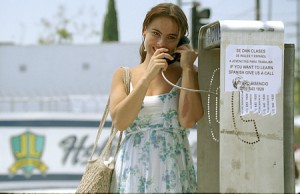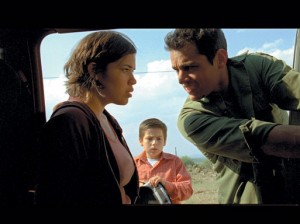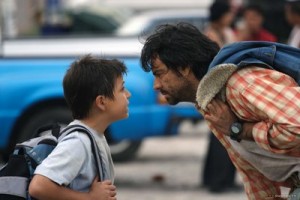Occasional pop theology contributor and Judd Apatow devotee, Wendy Arce, provides a review of the recent film, La Misma Luna (Under the Same Moon). Read on.
Patricia Riggen’s La Misma Luna (Under the Same Moon) is a film that makes the realities of border migration palpable for any audience. Detailing the all too real story of families torn apart due to illegal Mexico-U.S. border crossings, the film portrays a mother and son who have not seen each other in four long years. After the son, Carlitos (Adrian Alonso), is left alone at the age of nine, he decides to pack up his book bag, gather his savings, and brave the U.S.-Mexico border in search of his mother in East Los Angeles. Not only is it a story that tells the heartbreaking reality of many families torn apart by borders, it also shows the goodness and hospitality of the people Carlitos meets along the way.
 The film opens with the sounds of water thrashing at nighttime as people are night swimming, but not like REM had in mind. This quiet night is filled with people swimming for their lives, only to find agents of the United States Citizenship and Immigration Services (USCIS) on the other side. Some people hide in the bushes as agents ambush an unlucky few who have braved drowning, thirst, and starvation for employment in the U.S., only to be caught and sent back as soon as they cross. Our protagonist, Rosario (Kate del Castillo), is among the lucky few in the bushes. In the next shot, Rosario awakens suddenly to an alarm clock. As she yells out, “Ya te levantaste (Are you up yet?),” the camera cuts to Carlitos getting ready. As he washes up in a barrel of water outside the house, Rosario prepares breakfast. In a clever editing maneuver, the director gives us the illusion that they are getting ready simultaneously, together. However, we soon realize that she is actually in Los Angeles, while he is taking care of his grandmother in Mexico. Carlitos gets dressed in his Sunday best, as she marks the day in her calendar – this particular day with “Carlitos’ Birthday” written on it. She walks down to a payphone with her phone card and Carlitos walks to the neighborhood phone. At ten a.m. every Sunday, Rosario and Carlitos share a few minutes’ worth of conversation. Carlitos says, “I’m ready to go to Los Angeles, mami.” Rosario answers, “Well, its not that easy to get papers Carlitos, but real soon, ok?” When she asks if he needs anything, Carlitos answers, “I need you. Four years is too long. Why don’t you come back?” The heartbreaking conversation demonstrates the hardships that every immigrant faces when they leave their children in another country to cross illegally and make a living. But to avoid placing Carlitos in the pain and frustration of illegal immigration, Rosario wants to bring him across legally. She first needs $4000 for a lawyer, who would not necessarily be able to guarantee her case anyway. Her hopes seem impossible.
The film opens with the sounds of water thrashing at nighttime as people are night swimming, but not like REM had in mind. This quiet night is filled with people swimming for their lives, only to find agents of the United States Citizenship and Immigration Services (USCIS) on the other side. Some people hide in the bushes as agents ambush an unlucky few who have braved drowning, thirst, and starvation for employment in the U.S., only to be caught and sent back as soon as they cross. Our protagonist, Rosario (Kate del Castillo), is among the lucky few in the bushes. In the next shot, Rosario awakens suddenly to an alarm clock. As she yells out, “Ya te levantaste (Are you up yet?),” the camera cuts to Carlitos getting ready. As he washes up in a barrel of water outside the house, Rosario prepares breakfast. In a clever editing maneuver, the director gives us the illusion that they are getting ready simultaneously, together. However, we soon realize that she is actually in Los Angeles, while he is taking care of his grandmother in Mexico. Carlitos gets dressed in his Sunday best, as she marks the day in her calendar – this particular day with “Carlitos’ Birthday” written on it. She walks down to a payphone with her phone card and Carlitos walks to the neighborhood phone. At ten a.m. every Sunday, Rosario and Carlitos share a few minutes’ worth of conversation. Carlitos says, “I’m ready to go to Los Angeles, mami.” Rosario answers, “Well, its not that easy to get papers Carlitos, but real soon, ok?” When she asks if he needs anything, Carlitos answers, “I need you. Four years is too long. Why don’t you come back?” The heartbreaking conversation demonstrates the hardships that every immigrant faces when they leave their children in another country to cross illegally and make a living. But to avoid placing Carlitos in the pain and frustration of illegal immigration, Rosario wants to bring him across legally. She first needs $4000 for a lawyer, who would not necessarily be able to guarantee her case anyway. Her hopes seem impossible.
 To complicate matters, we soon find out that Rosario’s mother and Carlitos’ caretaker, Benita Reyes (Angelina Pelaez) is sick, and it is unlikely that she will recover. This prompts their neighbors, Carlitos’ brother, and his absentee father to convince Carlitos to leave his grandmother’s house to live with them. Carlitos does not want to move in with the strangers and would prefer to take care of his grandmother. Carlitos’ uncle says that his mother will never return, playing to Carlitos’ biggest fear. But in the midst of this, on Monday, he meets Marta and David (America Ferrera and Jesse Garcia) who, as second or later generation Latino/as were born in the U.S., offer to smuggle babies into the country to Carlitos’ boss, coyote Dona Carmen. Although Dona Carmen would not take their business, they offer an important contact for Carlitos, as he plots his reunion with his mother.
To complicate matters, we soon find out that Rosario’s mother and Carlitos’ caretaker, Benita Reyes (Angelina Pelaez) is sick, and it is unlikely that she will recover. This prompts their neighbors, Carlitos’ brother, and his absentee father to convince Carlitos to leave his grandmother’s house to live with them. Carlitos does not want to move in with the strangers and would prefer to take care of his grandmother. Carlitos’ uncle says that his mother will never return, playing to Carlitos’ biggest fear. But in the midst of this, on Monday, he meets Marta and David (America Ferrera and Jesse Garcia) who, as second or later generation Latino/as were born in the U.S., offer to smuggle babies into the country to Carlitos’ boss, coyote Dona Carmen. Although Dona Carmen would not take their business, they offer an important contact for Carlitos, as he plots his reunion with his mother.
The following morning, Carlitos awakens to serve his grandmother breakfast only to find that she has passed away in her sleep. Carlitos is alone, and instead of contacting his distant relatives, he decides to leave for Los Angeles, praying that he can reach his destination by Sunday so his mother won’t worry. He contacts Marta and David, and, with the money he has saved up from his mother’s remittance, he pays them to take him to the U.S. Carlitos runs into an unfortunate series of events, which force him to hide in the floor of a minivan which is then impounded for unpaid parking tickets. He escapes at nighttime, but looses all of his money in the process. As a result, he falls into the wrong crowd that tries to sell him to some other man, possibly for sexual purposes, but he miraculously ends up in care of Reyna (Maria Rojo), the owner of a local safe house for illegal workers. Given his trusting naïveté, she decides that a bus trip to Los Angeles from El Paso is out of the question. Instead, she sends him along in a car of undocumented workers who are heading west to pick crops along the way.
Reyna is the first example of a good and hospitable person. When she sees Carlitos being forced into a car, she rushes in to save him, throwing money at the creep who attempted to sell him. She spends $100 welcoming him into her illegal safe house. She also gives him a way to reunite with his mother by the end of the week. As a symbol of hospitable service, she risks her own wellbeing to benefit the undocumented.
Despite Reyna’s best efforts, things do not go Carlitos’ way. As he works with the fellow illegals in a tomato field, the USCIS agents raid the workers. Carlitos and one other companion hide in the fields, while some of the other workers manage to escape. The only person left for Carlitos to trust is Enrique (Eugenio Derbez)–the one person who was most hesitant to bring Carlitos along. Although Enrique does not want to take care of Carlitos, he stubbornly follows him as they hitchhike further west. Having caught a ride with the Tigres del Notre Mexican band all the way to Tucson, Carlitos lands them a job at a diner there. Though Carlitos begins to lose hope that he will make it to L.A. or that his mother even wants him there, Enrique finally sympathizes with Carlitos and motivates him to persevere, offering his assistance in reuniting him with his mother.
Though Carlitos now has a means of support, he is still uncertain about his mother’s exact location. Carlitos must find the telephone booth that his mother calls from every Sunday: Enrique realizes the impossibility of such a task. After Enrique and Carlitos make it to L.A. and spend the night in a park. The next morning, police officers descend on Carlitos, no doubt to check his immigration status and deport him back to Mexico. However, in an act of self-sacrifice, Enrique distracts the cops in time for Carlitos to escape. With a bit of perseverance, help from friends, good luck, and a bit of Hollywood magic, Carlitos finally finds his mother. Illegal or not, we can rejoice in their reunion after four years of separation. They are now able to support one another through the difficulties that lie ahead, possibly opening up opportunities for Carlitos in the U.S. and giving his mother the support she needed from the most important person in her life.
La Misma Luna is a symbol of hospitality and self-sacrifice for the wellbeing of others, especially for the innocent children who are often caught in the middle of these controversial situations.
La Misma Luna (106 mins.) is rated PG-13 for thematic elements.











